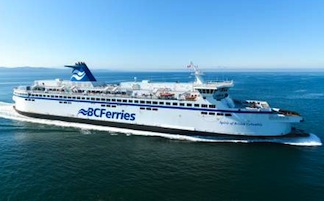The following is text of a news release from BC Ferries:
(VICTORIA, British Columbia) — Spirit of British Columbia, one of BC Ferries’ two largest vessels, returns to service Wednesday on the Metro Vancouver (Tsawwassen)-Victoria (Swartz Bay) route following the completion of a midlife upgrade. Spirit of Vancouver Island will undergo a midlife upgrade from fall 2018 to spring 2019.
The vessel is the first of two to be converted to operate on natural gas, which is much cleaner for the environment than marine diesel. BC Ferries expects to reduce CO2 emissions by 12,500 tonnes annually, the equivalent of taking approximately 2,500 vehicles off the road per year by using natural gas to fuel the two Spirit-class vessels. Simultaneously fuel costs will be reduced by millions when both ships are in service operating on natural gas.
Spirit of British Columbia is the first passenger vessel in the world to refuel liquefied natural gas via delivery on a fully enclosed vehicle deck. The Salish-class vessels introduced last year were the first passenger vessels in the world to fuel liquefied natural gas on an open vehicle deck via delivery truck. Both of these innovations were conceived by BC Ferries and designed, engineered and built by BC Ferries and its partners. The natural gas is provided by FortisBC and can be reliably delivered in B.C., which supports the local economy. These innovations saved BC Ferries’ customers more than $100 million in infrastructure costs that would have otherwise been required and have proven significant environmental benefits.
“The Spirit of British Columbia returns to service with clean technology that reduces both our environmental footprint and cost of operations,” said Mark Collins, BC Ferries’ president and CEO. “The two Spirit-class vessels consume approximately 16 percent of our fuel annually. The conversion of our two largest ships in the fleet, along with the introduction of our three new natural gas-fueled Salish-class vessels last year, goes a long way to improving the sustainability of our operations and affordability for ferry users.”
Other upgrades include the renewal of navigation equipment, propulsion equipment components including gearboxes, rudders, steering system, bow thrusters, propeller blades, LED lighting, more efficient air conditioning equipment to reduce energy consumption and four marine evacuation systems.
In addition to the natural gas conversion, BC Ferries upgraded the vessel’s passenger areas with new carpeting, furniture upholstery, new table tops, refurbishment of all public washrooms, as well as an additional washroom on deck 5. BC Ferries added a new Arbutus coffee bar on deck 6 and doubled the size of Passages onboard retail store.
Spirit of Vancouver Island will follow and complete the upgrade and natural gas conversion from the fall of 2018 through the spring of 2019. This schedule will allow for the vessel, the largest in the fleet, to be back in operation during the summer months when traffic is at its highest.

